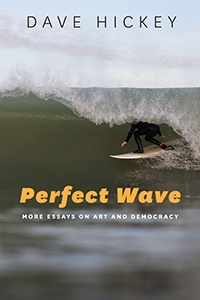by Dave Hickey
University of Chicago Press, $25 (hardcover)
For a decade or so after publishing his essay collection Air Guitar (1997), Dave Hickey was among the most esteemed of American art critics. More recently, though, sexist outbursts, a bogus retirement and the general sense that his anti-institutional stance equates to pro-market conservatism have threatened to undo his rep. Perfect Wave, the long-gestating sequel to Air Guitar, might then be seen as an attempt at restitution – particularly after the typically beautifully written but problematically predicated 25 Women: Essays on their Art (2015) – though one suspects Hickey has another agenda. He’s published three books in four years compared to two in the preceding twenty, giving him, at seventy-six, the air of someone in a hurry. Perfect Wave, mostly examining his fascinations outside art, feels like a ritzy clearinghouse, maybe even a valediction.
Once a music writer (and musician), Hickey reminds us he can still do that, launching into a rhapsodic bar-by-bar breakdown of The Carpenters’ 1972 ballad Goodbye to Love. He goes to Disneyland and stubbornly adores it, seeing in the animism of everything from teacups upwards a species of American paganism. Consistently he treats mainstream – or ‘democratic’ – experience as seriously as high art; and he brings high art down to gossip level, an essay on art fairs devolving into anecdotes about his good friend, Frieze’s Matthew Slotover. Elsewhere Hickey covers the waterfront, asserting he’s a cineaste (on Michelangelo Antonioni, pointing up the Italian director’s unique approach to framing), a literary critic (on scholars Terry Castle and Susan Sontag), even a political bloodhound, going on the campaign trail in Nevada – the results arid in comparison to similar assignments by David Foster Wallace and Hunter S. Thompson. Also, nobody wants to read about Bush-era politics given the current state of the US.
You keep waiting for the chauvinism. Instead the vexation factor comes from Hickey’s mentions of his ‘genius brain’, his God-given ability to understand this or that. He’s pleased with himself, for sure: for his smarts, his versatility and something else. While the book opens with a vivid memoir of his days as a preteen California surfer – ending with a rib-cracking wipeout – the ‘wave’ of the title refers, you might think, to something else: the fortunate arc of Hickey’s life, the ride he caught. He was around for jazz, rock-and-roll, Robert Mitchum, Antonioni and Andy Warhol, all gone now except for the writing-up; he’s probably getting out before the shit really hits the fan; and now he’s waving to us.
From the Winter 2017 issue of ArtReview ArtReview Asia
